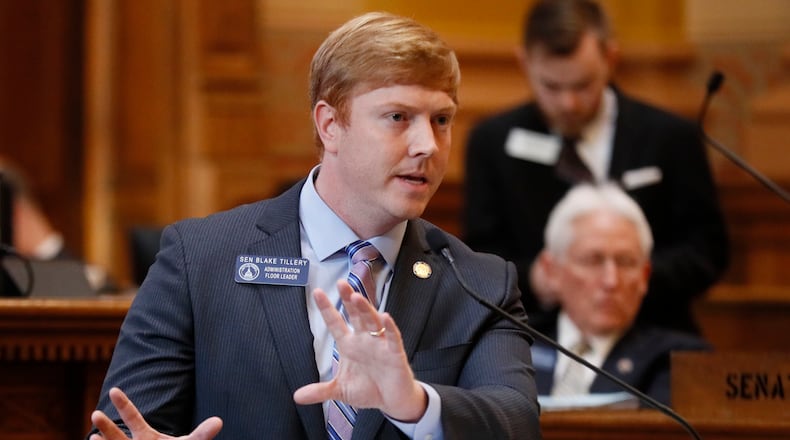Georgia Senate leaders moved Thursday to increase funding for the state’s public health agency that has been battling the COVID-19 pandemic for almost a year.
The money was included in the chamber’s version of the midyear state budget that runs through June 30. The Senate Appropriations Committee on Thursday approved the midyear plan, which would increase state spending about $650 million overall.
The largest increase is in education, where the House and Senate are going along with Gov. Brian Kemp’s proposal to backfill 60% of the spending reductions lawmakers approved last year, when they cut 10% because of fears that state revenue would plummet due to the pandemic. That didn’t happen.
But it also continues what the House started last month, increasing Department of Public Health funding after critics said Kemp’s original budget didn’t do enough for the agency.
The House passed the midyear budget last week, and the full Senate will likely do the same early next week in hopes of quickly assuring agencies they will be funded through the end of June. The chambers agreed to push through a budget in case they have to suspend the session — as they did in March — because of the pandemic.
Lawmakers are being tested twice a week for the coronavirus, and several legislators and staff have missed time since the session started Jan. 11 because they got COVID-19. At a House Retirement Committee meeting earlier this week, the chairman said he had hoped to have a joint meeting with Senate colleagues. But five of eight Senate committee members either had COVID-19 or were isolating at the time, he said.
Senate Appropriations Chairman Blake Tillery, R-Vidalia, said Thursday that the Senate went along with key additions to the budget made by the House.
They included paying for 500 new school buses and increasing support for nursing homes hit hard by COVID-19. The Senate also backed Kemp’s proposals to add high-speed internet in rural areas and provide 10% raises for corrections and juvenile justice guards.
Kemp and lawmakers have faced criticism in recent weeks for not boosting state funding for the Department of Public Health before and during the pandemic.
Demands on local health agencies, and on Georgia’s public health system in general, have increased in recent years. Public health advocates have long complained about inadequate funding for AIDS/HIV prevention, controlling chronic illnesses and other needs.
The state has collected a little more than $1 billion in additional federal funding, which has paid for such virus-related expenses as private laboratory testing, operation of the state’s labs, temporary “surge” staffing, personal protective equipment and an isolation unit for people who contracted the coronavirus. The federal money also covered expenses by the state’s 159 county health departments, which normally depend on state appropriations.
House budget writers added money for a chief medical officer, deputy commissioner and chief data officer, plus $18 million to quickly modernize the computer system that tracks immunizations. The Senate increased that to $27 million, and it added positions for a a senior programmer and a financial manager.
The Senate also funded a new position in the Department of Labor after Labor Commissioner Mark Butler was criticized by senators over his response to auditors asking for financial reports. The “chief labor officer,” Tillery said, “would oversee the commissioner in his duties on unemployment insurance and timely response to financial audits.”
Butler’s position is an elected one, and he runs the agency that oversees the payout of unemployment benefits.
However, lawmakers have been hearing complaints from constituents since March about their difficulty getting unemployment benefits as the department was overwhelmed by record claims when the pandemic hit. Butler has said his agency has been working with half the staff it had a decade ago, and it has paid out more in benefits in less than a year — $17.3 billion — than it had in the previous 34 years.
The state auditor has also said Georgia’s coveted AAA bond rating — which saves millions of dollars a year in borrowing costs — could be in jeopardy because he hasn’t received complete financial data from the Department of Labor.
Butler said State Auditor Greg Griffin’s office made an end-of-the-year request for information on several hundred thousand unemployment cases that was impossible to quickly deliver. He called Griffin’s complaint, which was raised during a recent Senate hearing, “a smear campaign.”
Butler said Thursday that he doesn’t understand why the General Assembly would want oversight of his agency. He said for the most part, lawmakers haven’t bothered to contact him.
“If they want to know what’s going on, all they have to do is pick up the phone and call,” he said.
Kemp and lawmakers added taxpayer money to the budget to help offset revenue losses at the state fairgrounds in Perry due to COVID-19, which hammered the convention, hospitality and trade show industry. Senate leaders upped the state supplement from $1.75 million to $3 million. They also added $3 million more in operations and marketing money for the World Congress Center.
The Senate also added $7.5 million to Kemp’s emergency fund in case he needs extra money to deal with the state’s massive effort to get Georgians a COVID-19 vaccine.
About the Author
Keep Reading
The Latest
Featured


